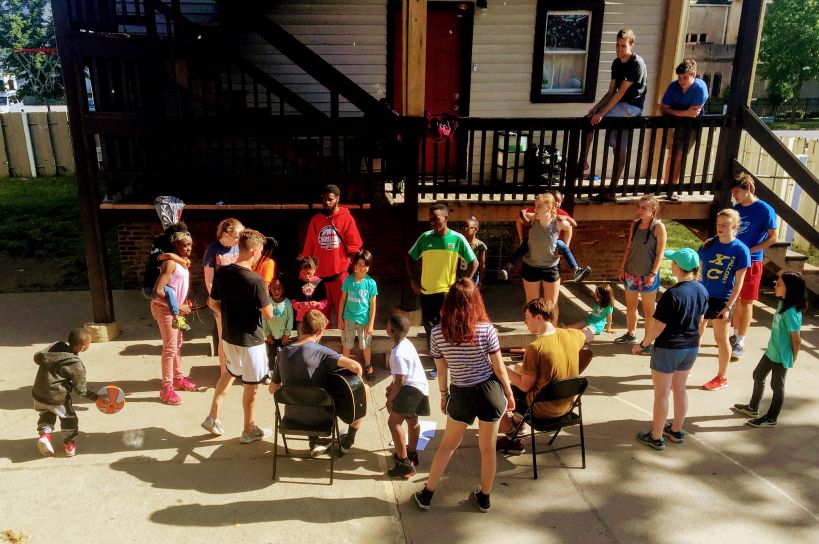
The birds sing at night in Englewood.
I ponder this as I lie on my air mattress in an upstairs room in front of a window cracked open this June night. All is dark, as dark as it can be in an inner city neighborhood. The only other noises besides the birds and the never-ending traffic are the unwelcome sirens that race by.
Why do the birds sing at night here?
Realistically, they may be confused by the urban lights into thinking dawn is just around the corner. Or they may be confused by the cold spring weather—normally signaling mating season—although the calendar announces summer.
Nevertheless, I decide the birdsong is a gift from the Lord to all those awake in the night in this place of little hope. It is a reminder of his steadfast love, his attentiveness to our prayers.
I am here with sixteen others from my church, most of them teenagers. We live in a big old house for a week, learning about the relationship between urban poverty and the riches of the gospel.
Our mentor is a man named Daniel—one brave in the face of the lions of violence, neglect, and desperation. He and his Jamaican colleague Justin are here because of the work of Christ on the cross to rescue us from hopelessness. They spend hours each week in this house and its yard creating a place of safety for the neighborhood children, a place to share the gospel.
Our team is here to meet these children. They come each afternoon when the gates are rolled open and the stereo on the upstairs porch booms Christian rap.
The children come to play, color, swing, eat, and hear stories of truth from the Bible.
They also come to sing.
A few of our teens pull out guitars and a cajon after telling a Bible story each day. They lead in songs like “Pharaoh, Pharaoh” and “Hallelu, Hallelu”, and the younger children join in. The older ones—those who play basketball and those who watch them—fade into the background during the time of Bible story and song. They are too cool. The words of the songs bounce around them like the basketball on the cement.
I meet one of the older ones, a girl who dresses like she is nineteen. I ask her what grade she will enter in the fall and she surprises me by answering, “8th”. In an effort to get to know her a little more, I ask how many sisters and brothers she has, and she surprises me again.
“I have no idea,” she states. “Too many to count.”
She is the second child to give me this answer this week. I can’t imagine the loss of identity that must come with not knowing who is in your own family. I already know that few of the fathers are around.
No wonder it seems like the children who come are either very young or pre-teens looking like twenty-somethings. They cannot linger in childhood in this neighborhood. Life is too hard. Hope dies young.
I think of the book, There Are No Children Here: The Story of Two Boys Growing Up in the Other America by Alex Kotlowitz. It is a 1992 biography that describes the experiences of two brothers growing up in an apartment block run by the Chicago Housing Authority. It’s been years since I read it as a college student, but the title comes back to me as I look around.
In tragic irony, some of these children won’t get the chance to grow up at all though they play at it too early on. Daniel attends a funeral for a young man—just 21 years old, the age of one of my own—while we are here. This young man was killed in a gang-related shooting, a news headline story that happens so often it gets overlooked.
Just like the community itself.
Yet there is a voice of hope.
We hear it in the men and women planting a community garden plot—a place of beauty boldly growing amidst abandoned lots full of trash and weeds. We stop to pray with them on our prayer walk, holding hands—white/black/white/black—and hear their cries to an all-powerful Lord for restoration of their neighborhood.
We hear it in the moms and grandmas who drop off their children at the Ministry, as the place where we stay is called. They want something more for those they love. Some of them don’t know yet that what they want is the gospel. We pray these children find it here.
We hear it in the neon-vested “Safe Passage” worker who stands on the street corner outside our windows chatting loudly with passersby and watching over kids walking home from school each afternoon.
We hear it in the dream of Daniel and Justin to start a church across the street, in the building of one that once was and is no more. They long to find pastors to come live here, in this forgotten place, and preach the gospel.
And I hear the it in the birdsong this night.
God has not abandoned Englewood. He is at work in the darkness, just like the birds who sing outside my cracked open window.
“Why are you cast down, O my soul? And why are you in turmoil within me? Hope in God; for I shall again praise Him, my salvation and my God…
By day the Lord commands His steadfast love, and at night His song is with me, a prayer to the God of my life.” (Psalm 42:5,8 ESV)

Tracy
I love this Cheryce.
30 . 06 . 2019Thank you.